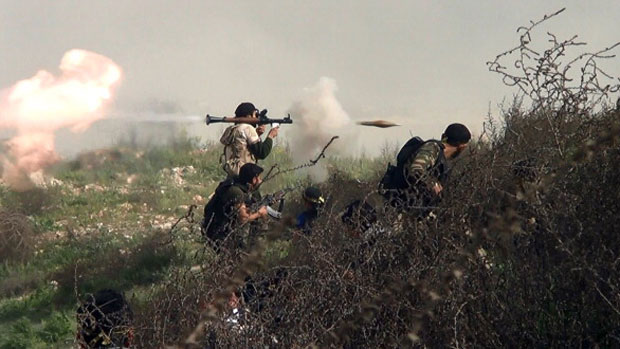West sends spies to Syria to counter jihadist threat
There's a 'schism' between those in West who want Assad gone and those who fear what replaces him

A free daily email with the biggest news stories of the day – and the best features from TheWeek.com
You are now subscribed
Your newsletter sign-up was successful
WESTERN intelligence officers have visited Damascus to discuss the most effective ways to tackle radical Islamist groups, Syria's deputy foreign minister has told the BBC.
The revelation that Western governments are consulting with the government of President Bashar al-Assad – the man they hold responsible for Syria's bloody civil war – suggests two things. Firstly, the high level of concern in the West at the spread of militant Islam in Syria and secondly the existence of a "schism" between Western politicians who continue to call for Assad to step down and security officials who fear he will be replaced by jihadist groups, the BBC says.
Faisal Mekdad, the Syrian deputy foreign minister, says that members of several Western intelligence agencies – including Britain's – recently visited the Syrian capital. "I will not specify but many of them have visited Damascus, yes," he says.
The Week
Escape your echo chamber. Get the facts behind the news, plus analysis from multiple perspectives.

Sign up for The Week's Free Newsletters
From our morning news briefing to a weekly Good News Newsletter, get the best of The Week delivered directly to your inbox.
From our morning news briefing to a weekly Good News Newsletter, get the best of The Week delivered directly to your inbox.
He also claims that an increasing number of countries are requesting that their diplomats return to Damascus. While some Western nations are waiting for the outcome of peace talks in Geneva next week before reassessing their engagement with Syria, others are asking to "co-operate on security measures", Mekdad claims.
The British Foreign Office told the BBC it does not comment on intelligence matters.
The BBC's chief international correspondent Lyse Doucet says it is still not clear "how far the West is prepared to make common cause with a regime it still holds responsible for this brutal war".
While Western politicians continue to insist Assad will eventually step down, it seems increasingly clear that the risk of power falling into the hands of jihadists is giving security agencies the jitters.
A free daily email with the biggest news stories of the day – and the best features from TheWeek.com
It is hard to confirm the extent of the contact between Damascus and the West, says Doucet. But "informed sources" say there have been meetings between Western and Syrian intelligence officials including security chief General Ali Mamluk.
-
 The 8 best TV shows of the 1960s
The 8 best TV shows of the 1960sThe standout shows of this decade take viewers from outer space to the Wild West
-
 Microdramas are booming
Microdramas are boomingUnder the radar Scroll to watch a whole movie
-
 The Olympic timekeepers keeping the Games on track
The Olympic timekeepers keeping the Games on trackUnder the Radar Swiss watchmaking giant Omega has been at the finish line of every Olympic Games for nearly 100 years
-
 Epstein files topple law CEO, roil UK government
Epstein files topple law CEO, roil UK governmentSpeed Read Peter Mandelson, Britain’s former ambassador to the US, is caught up in the scandal
-
 Iran and US prepare to meet after skirmishes
Iran and US prepare to meet after skirmishesSpeed Read The incident comes amid heightened tensions in the Middle East
-
 Syria’s Kurds: abandoned by their US ally
Syria’s Kurds: abandoned by their US allyTalking Point Ahmed al-Sharaa’s lightning offensive against Syrian Kurdistan belies his promise to respect the country’s ethnic minorities
-
 Israel retrieves final hostage’s body from Gaza
Israel retrieves final hostage’s body from GazaSpeed Read The 24-year-old police officer was killed during the initial Hamas attack
-
 China’s Xi targets top general in growing purge
China’s Xi targets top general in growing purgeSpeed Read Zhang Youxia is being investigated over ‘grave violations’ of the law
-
 Syria’s Islamic State problem
Syria’s Islamic State problemIn The Spotlight Fragile security in prison camps leads to escape of IS fighters
-
 Panama and Canada are negotiating over a crucial copper mine
Panama and Canada are negotiating over a crucial copper mineIn the Spotlight Panama is set to make a final decision on the mine this summer
-
 Why Greenland’s natural resources are nearly impossible to mine
Why Greenland’s natural resources are nearly impossible to mineThe Explainer The country’s natural landscape makes the task extremely difficult